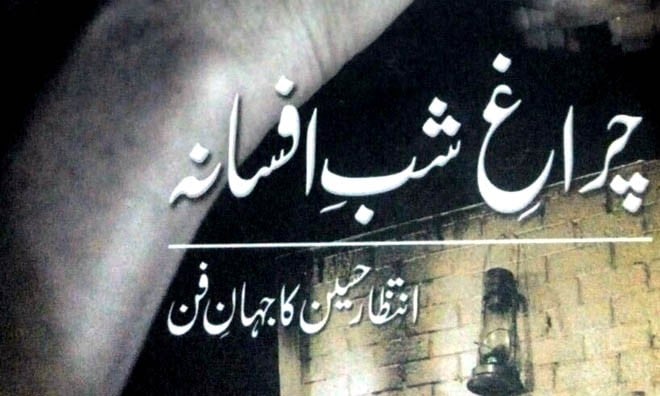
Asif Farrukhi writes a definitive work on Intizar Husain’s life and craft

Intizar Husain is the name of an era. As they say whenever a literary giant leaves this stage of life, he lives on in the form of the literary treasure he leaves behind that his readers can then dip into. Just like his countless admirers, Asif Farrukhi a noted critic, scholar and fiction writer in his own right, got hooked on to Intizar Husain quite early in his life which revolved around literature and books. Every now and then, we read Farrukhi’s illuminating articles and reviews of new books and fiction writers of the world.
Farrukhi couldn’t outgrow the habit of Intizar Husain over the past many decades as he religiously followed each of his works. He wanted to explore the great Intizar Husain in totality and even had a chance to travel with him. Now he has drawn a detailed and comprehensive literary profile of Intizar Husain which is unique as he has covered almost all literary aspects of him. Charagh-e-Shab-e-Afsana is the outcome of a few years of labour over which the book kept increasing in size and content.
Farrukhi writes in the introduction that he prodded Intizar sahib again and again, and sought answers to many of his literary queries much to his chagrin. Sadly, Intizar sahib couldn’t see the book in its published form as he breathed his last while the thick volume was still under publication but he did read its manuscript.
The book deftly explores all creative sides of the great writer -- as a fiction writer, novelist, literary critic, journalist, travel writer, sketch writer, translator, columnist and children’s writer. To my knowledge, no other book digs so deep to discover what made Intizar Husain a master writer of his times.
He kicks off with a detailed biographical sketch of Intizar Husain and rues the fact that even not a single authentic biographical study of him has been written so far. Even his date of birth had been quoted differently. Perhaps, according to the author, Intizar sahib himself didn’t attach much importance to when he was born. The author quotes Brazilian novelist Clarice Lispector who says that "you who are reading me please help me to be born". Perhaps Intizar Husain also wanted his readers to make him "be born" again through his work.
The detailed chapter on his biographical and other related details turns out to be very informative for lay readers like us. It tells us that Intizar Husain was deeply influenced by Urdu writer and educationist Prof Karrar Hussain who was his teacher at Meerut College from where he did his masters in Urdu in 1946. Intizar sahib continued to hold him in high esteem throughout his life as he himself said that the image of Karrar Hussain is still intact in his mind. Due to Karrar Husain’s influence, he drifted towards the subject of linguistics and even wrote an introductory book on it.
Starting off as a linguist, he showed his maiden attempt to Maulvi Abdul Haq who referred the book to another expert in the subject. The book didn’t see the light of the day as Intizar sahib intentionally discarded its manuscript.
Farrukhi writes that Intizar Husain was under the awe of the poetry of Noon Meem Rashed, especially his book Mavra, as he too started writing blank verse. But that was no to be. The infatuation with poetry proved short-lived and thus started an illustrious sojourn into the alley of fiction and after that there was virtually no looking back by the esteemed author.
Farrukhi has written chapters on his fiction, novels, translations, sketches, columns, travelogues, children’s literature, not leaving any aspect of Intizar sahib’s literary life untouched. However, at times, one feels the tone is too reverential and not one that objectively judges Intizar Husain’s literary merit.
Yet, without an iota of doubt, this is the best book written so far on Intizar Husain. No serious reader of Urdu can afford to miss the book which is a real treat to read. Farrukhi has paid due homage to the great writer in delectable prose which makes you finish the book in a few long sittings.
Feb 2 is Intizar Husain’s first death anniversary